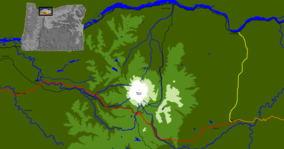Barlow Road
| Barlow Road | |
|---|---|
| Route of the Barlow Road (red); some consider the yellow route from The Dalles as part of the road | |
| Location | Oregon, USA |
| Nearest city |
The Dalles Government Camp Oregon City |
| Established | 1845 |
|
Barlow Road
|
|
| NRHP Reference # | 92000334 |
| Added to NRHP | April 13, 1992 |
The Barlow Road (at inception, Mount Hood Road) is a historic road in what is now the U.S. state of Oregon. It was built in 1846 by Sam Barlow and Philip Foster, with authorization of the Provisional Legislature of Oregon, and served as the last overland segment of the Oregon Trail. Its construction allowed covered wagons to cross the Cascade Range and reach the Willamette Valley, which had previously been nearly impossible. Even so, it was by far the most harrowing 100 miles (160 km) of the nearly 2,000-mile (3,200 km) Oregon Trail.
Before the opening of the Barlow Road, pioneers traveling by land from the east followed the Oregon Trail to Wascopam Mission (now The Dalles) and floated down the Columbia River to Fort Vancouver, then a perilous and expensive journey. It was also possible to drive livestock over Lolo Pass on the north side of Mount Hood, but that trail was too rugged for vehicles and unsuitable for wagons.
The Barlow Road begins at The Dalles and heads south to Tygh Valley (some consider Tygh Valley to be the beginning), then turns west and roughly parallels the White River on the north and then west, crosses the south shoulder of Mount Hood at Barlow Pass, follows Camp Creek and the Sandy River for some way, and finally leads to Oregon City. The road was rendered largely irrelevant in the early 1900s by the construction of the Mount Hood Highway. It still exists as a dirt road in some places, while many other parts have been paved over by newer streets and highways.
...
Wikipedia

